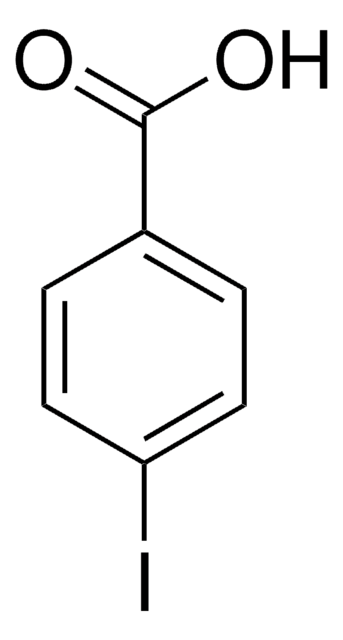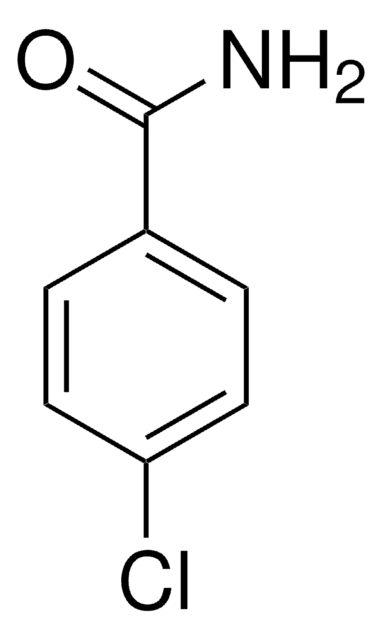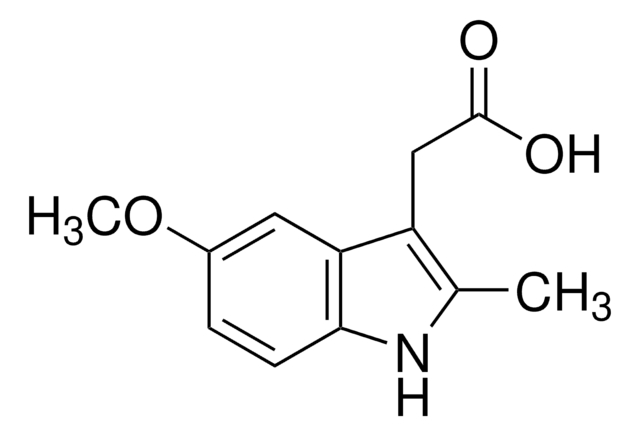135585
4-Chlorobenzoic acid
99%
Synonym(s):
4-CBA, p-Chlorobenzoic acid
Sign Into View Organizational & Contract Pricing
All Photos(3)
About This Item
Linear Formula:
ClC6H4CO2H
CAS Number:
Molecular Weight:
156.57
Beilstein:
907196
EC Number:
MDL number:
UNSPSC Code:
12352100
PubChem Substance ID:
NACRES:
NA.22
Recommended Products
Assay
99%
form
powder
mp
238-241 °C (lit.)
solubility
methanol: soluble 1%, clear, colorless to faintly yellow
functional group
carboxylic acid
chloro
SMILES string
OC(=O)c1ccc(Cl)cc1
InChI
1S/C7H5ClO2/c8-6-3-1-5(2-4-6)7(9)10/h1-4H,(H,9,10)
InChI key
XRHGYUZYPHTUJZ-UHFFFAOYSA-N
Looking for similar products? Visit Product Comparison Guide
Related Categories
General description
4-Chlorobenzoic acid is a degradation product of indomethacin. It is degraded by Acinetobacter sp. strain ST-1 and causes its dehalogenation to yield 4-hydroxybenzoic acid under both aerobic and anaerobic conditions.
Application
4-Chlorobenzoic acid can be used:
- As a ligand to synthesize luminescent lanthanide complexes for bio-labeling or fiber communication applications.
- To prepare organotin(IV) chlorobenzoates exhibiting anticorrosion properties.
- As a ligand to synthesize di-n-butyl(4-chlorobenzoxy)(4-chlorobenzohydroxamato)tin(IV).
Signal Word
Warning
Hazard Statements
Precautionary Statements
Hazard Classifications
Acute Tox. 4 Oral
Storage Class Code
11 - Combustible Solids
WGK
WGK 2
Flash Point(F)
460.4 °F - closed cup
Flash Point(C)
238 °C - closed cup
Personal Protective Equipment
dust mask type N95 (US), Eyeshields, Gloves
Choose from one of the most recent versions:
Already Own This Product?
Find documentation for the products that you have recently purchased in the Document Library.
Customers Also Viewed
Q Q Cai et al.
Water research, 183, 116119-116119 (2020-07-15)
Fluidized bed reactor Fenton (FBR-Fenton) process was adopted for reverse osmosis concentrate (ROC) treatment with three types of carriers, including sand, zeolite and granular activated carbon (GAC). Adsorption studies demonstrated that GAC achieved the best adsorption performance (maximum COD removal
S M Lindenauer et al.
Biomedical engineering, 11(9), 301-306 (1976-09-01)
Knitted Dacron cloth fabricated into tubes has gained widespread acceptance as an arterial prosthesis. Continued research and development in the field of vascular prostheses is required because existing materials are not ideal. This paper relates general developments in vascular prosthesis
Ruiyang Xiao et al.
Environmental pollution (Barking, Essex : 1987), 257, 113498-113498 (2019-11-26)
Carbamazepine (CBZ), a widely detected pharmaceutical in wastewaters, cannot currently be treated by conventional activated sludge technologies, as it is highly resistant to biodegradation. In this study, the degradation kinetics and reaction mechanisms of CBZ by hydroxyl radical (OH) and
Kikuo Kobayashi et al.
The Journal of general and applied microbiology, 43(2), 105-108 (1997-04-01)
Acinetobacter sp. strain ST-1, isolated from garden soil, can mineralize 4-chlorobenzoic acid (4-CBA). The bacterium degrades 4-CBA, starting with dehalogenation to yield 4-hydroxybenzoic acid (4-HBA) under both aerobic and anaerobic conditions, suggesting that the dehalogenating enzyme in the strain is
Heather O'Neal Tugaoen et al.
The Science of the total environment, 613-614, 1331-1338 (2017-10-04)
A key barrier to implementing photocatalysis is delivering light to photocatalysts that are in contact with aqueous pollutants. Slurry photocatalyst systems suffer from poor light penetration and require post-treatment to separate the catalyst. The alternative is to deposit photocatalysts on
Our team of scientists has experience in all areas of research including Life Science, Material Science, Chemical Synthesis, Chromatography, Analytical and many others.
Contact Technical Service











